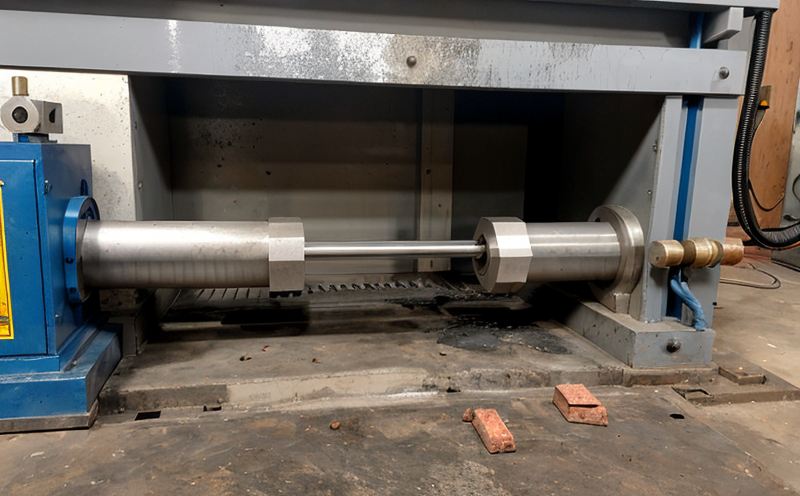ISO 6892-2 Elevated Temperature Tensile Testing
The ISO 6892-2 standard provides a comprehensive framework for conducting tensile tests on metallic materials under elevated temperature conditions. This service is particularly crucial in industries where the performance of materials at high temperatures, such as aerospace, automotive, and power generation, directly impacts safety and reliability.
Elevated temperature tensile testing is essential for understanding how materials behave when exposed to stresses while simultaneously operating at increased temperatures. This information helps ensure that components meet stringent design criteria under expected environmental conditions.
The standard specifies the procedure for determining the tensile properties of metallic materials in a controlled environment where temperature is varied according to specified limits. The method ensures consistent and reproducible results, which are critical for compliance with international standards and regulations.
The testing process involves subjecting samples to defined temperatures while applying tension until failure occurs. This allows engineers to evaluate the strength, ductility, and elongation characteristics of materials under stress at elevated temperatures. The results provide invaluable insights into material performance in real-world applications where high operating temperatures are encountered.
Materials used in industries such as aerospace, automotive, and power generation often experience extreme conditions that require rigorous testing to ensure safety and reliability. By using ISO 6892-2 tensile testing, manufacturers can confirm that their products will withstand these challenging environments without compromising performance or integrity.
The standard also covers the selection of appropriate specimens, test fixtures, and environmental controls necessary for accurate measurements. Proper specimen preparation is critical to obtaining reliable data, as imperfections in the sample could lead to erroneous results. Specimens are typically cut from larger pieces of material using precise methods to ensure uniformity.
Environmental control during testing is equally important, as any deviation from specified conditions may affect the outcome. Temperature stability and humidity levels must be maintained within strict tolerances throughout the test duration. This ensures that the results accurately reflect the true behavior of the material at elevated temperatures.
The instrumentation used in this type of testing includes high-precision tensile machines capable of applying controlled loads to specimens while simultaneously monitoring displacement, strain, and stress levels. Advanced sensors provide real-time data on these parameters, allowing for continuous assessment during the test process.
Post-test analysis involves evaluating the collected data to determine key mechanical properties such as yield strength, ultimate tensile strength, and elongation at break. These values help assess whether the material meets specified requirements laid out in relevant standards or customer specifications.
Elevated temperature tensile testing plays a vital role in ensuring that materials perform reliably under severe conditions found in various industrial applications. By adhering to ISO 6892-2, labs can provide accurate and consistent test results that contribute to safer designs and more dependable products.
- Ensures compliance with international standards
- Provides reliable data for material selection
- Aids in product development through informed decisions
- Supports regulatory requirements for various industries
- Maintains quality control throughout manufacturing processes
Scope and Methodology
The scope of ISO 6892-2 elevated temperature tensile testing encompasses the determination of tensile properties for metallic materials subjected to specified temperatures. This includes yield strength, ultimate tensile strength, and elongation at break under controlled environmental conditions.
Methodology involves preparing specimens according to standard procedures, placing them in a high-temperature environment, applying tension gradually until failure occurs, and recording all relevant measurements throughout the process. Specimens are typically made from various types of metals commonly used in engineering applications.
The methodology also specifies requirements for laboratory equipment, including tensile testing machines, heating chambers, and temperature control systems. All instruments must meet strict calibration standards to ensure accurate readings. Environmental controls play a key role in maintaining consistent temperatures during the test period.
Specimen preparation is crucial, as it directly influences the accuracy of results obtained from elevated temperature tensile testing. Samples are cut using precise methods that guarantee uniformity across all specimens tested. Proper handling and storage of materials prior to testing further enhance reliability.
Data analysis involves evaluating collected information against established criteria outlined in ISO 6892-2. This includes statistical evaluation of mechanical properties, which helps identify trends or anomalies within datasets. Reporting standards ensure that findings are communicated clearly and concisely for easy interpretation by stakeholders involved in material development projects.
Compliance with this international standard guarantees consistent results across different laboratories worldwide, fostering trust among clients who rely on accurate assessments when making critical decisions about their products' suitability for specific applications.
Quality and Reliability Assurance
Ensuring high-quality outputs is paramount in ISO 6892-2 elevated temperature tensile testing. Our laboratory employs rigorous quality control measures to maintain precision and accuracy throughout every stage of the process—from specimen preparation to final analysis.
We utilize state-of-the-art equipment calibrated according to international standards, ensuring that all tests adhere strictly to specified parameters. Regular calibration checks are performed by certified technicians using traceable reference materials provided by recognized organizations like NIST or BIPM.
Our trained personnel follow strict protocols for sample preparation and handling, minimizing potential sources of error. This includes precise cutting techniques combined with controlled storage conditions that prevent degradation before testing begins.
Data management practices are robust, allowing seamless integration between different stages of the testing procedure. Secure databases store all relevant information securely while facilitating quick retrieval when needed by authorized personnel involved in review processes.
Continuous improvement efforts focus on staying updated with latest advancements in technology and methodology related to elevated temperature tensile testing. Regular training sessions are conducted for staff members to ensure they remain proficient in using modern equipment effectively without compromising safety standards.





